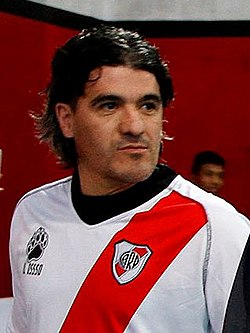Fenerbahçe and ban
In May 2002, Fenerbahçe signed Ortega from River Plate for a fee of US$7,500,000 (US$2,500,000 of which was paid to Parma). Fenerbahçe also bought his image rights for a further US$1,500,000. Ortega signed a 4-year contract. [9] He was one of the key players of the team, scoring 5 goals in 14 matches.
Fenerbahçe were forced to file a complaint to FIFA in April 2003 as Ortega had failed to return from international duty since 12 February 2003. [9] In June 2003 the FIFA Dispute Resolution Committee (DRC) ordered Ortega to pay Fenerbahçe USD 11,000,000 as compensation for breach of an employment contract and suspended him until 30 December 2003. [9] Ortega appealed to the Court of Arbitration for Sport in July 2003 but the case was dismissed on 5 November. [9] Ortega served a 4-month suspension from that day. [9] After the ban he was without a club.
Return to Argentina
In 2004, when he could finally come back to football, he joined Newell's Old Boys after he was called by his friend Américo Gallego, who at the time was Newell's' coach. Newell paid an unknown sum to Fenerbahçe as part compensation for what Ortega owed the club. They won the Apertura 2004.
In June 2006, he went back to his first team River Plate, where he played for about half of the Apertura 2006, [10] before he stopped to begin treatment for alcoholism. In January 2007, during River's pre-season in Mar del Plata, and one day after playing an excellent game in which he scored, he surprised everyone with another alcoholic episode, after which River Plate's doctors suggested to the coach that Ortega should go back to Buenos Aires to resume treatment for his problem.
Coach Daniel Passarella later brought Ortega back, stating he was ready for a comeback. On 15 March 2007, in a Copa Libertadores 2007 match against LDU Quito, Ortega formed part of River's bench but was not given a chance to play. However, three days later, in a league match versus Quilmes, he came on during the second half to help break the opposing team's defense in a tight 0–0 up to that point. Ortega scored a controversial goal with his hand, in the 93rd minute, to give River the victory and himself a great comeback.
Upon the arrival of Diego Simeone as head coach of River, Ortega allegedly lost some "protections" he was rumoured to have and, despite being an important part of the team that achieved the Clausura 2008 title, Simeone left him out of the squad for the upcoming season, reasoning his decision on Ortega having several times not come to train as well as some episodes of alcoholism. [11] [12] [13] After some controversy [14] and rumours [15] [16] in the winter window of Argentine market, he was loaned to Nacional B side Independiente Rivadavia, [17] signing a one-year contract where a twice a week trip to a Chilean Special Treatment Center for alcoholics [18] is one of the clauses. On 1 May 2009 he was let go by Independiente officials. The club decided to terminate his contract in advance. Ortega was on loan from River Plate. On his first game back in River Plate, 25 July 2009, he scored an outstanding chip shot goal to give River a 1–0 victory over Everton of England in Edmonton, Canada during the pre-season. In the 2009 Apertura, Ortega scored a wonder lobbed goal against Chacarita Juniors to give River Plate a 4–3 victory. Later in the tournament, he scored a last minute equalizer against Estudiantes.
In the 2010 Clausura, Ortega started River's first two matches, but suffered another alcoholic relapse and missed the next ten games before returning against Newell's Old Boys in the 13th round of matches.
In 2011, he was loaned to Defensores de Belgrano.
On 8 April 2012, Fox Sports Argentina journalist Juan José Buscalia, confirmed that Ortega would join Chilean Primera División club Unión San Felipe in June 2012.
